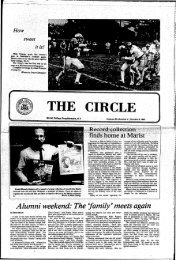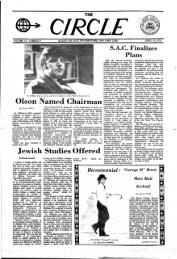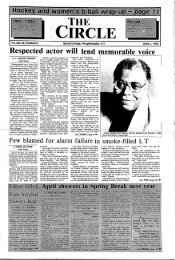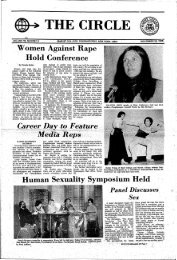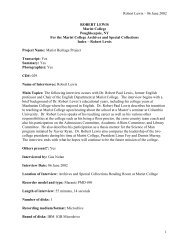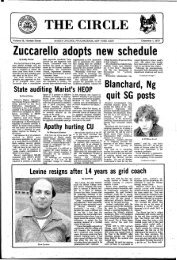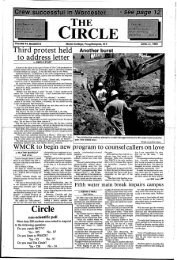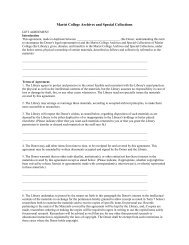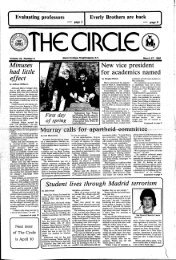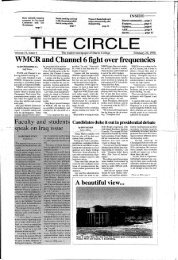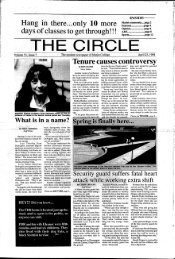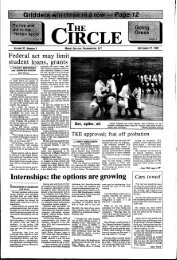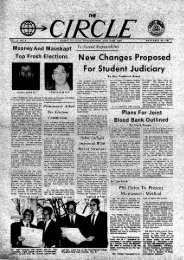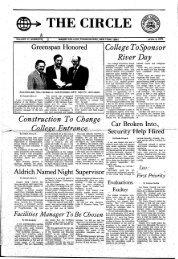Vol. 29 No. 20, May 3, 1984 - James A. Cannavino Library - Marist ...
Vol. 29 No. 20, May 3, 1984 - James A. Cannavino Library - Marist ...
Vol. 29 No. 20, May 3, 1984 - James A. Cannavino Library - Marist ...
Create successful ePaper yourself
Turn your PDF publications into a flip-book with our unique Google optimized e-Paper software.
7S-, Page 8 - THE CIRCLE - <strong>May</strong> 3,<strong>1984</strong>For refugee,a long roadto freedom<strong>May</strong> 3,<strong>1984</strong> • THE CIRCLE - Page 9by CammieSteffichWalking out your front doorand being able to go just aboutanywhere you please is a freedommany of us take for granted.For Trang Van Tran, it is afreedom he will cherish for therest of his life.Van Tran is a 22-year-oldVietnamese refugee who riskedhis life by escaping from hiscountry."Vietnam is a very terribleplace to live," Van Tran said."You cannot live in peace there. Ihad to escape. 1 wanted to befree."-So Van Tran arranged tobecome part of an escape partythat would leave Vietnam byboat."My parents, brother, andsister decided to stay in Vietnam,"he said. "It was verytough leaving them. 1 don't knowif I'H ever see them again."Van Tran set off on his searchfor freedom. He and 44 otherssecretly boarded a boat inVietnam.The sailing was not smooth forthe tiny boat of refugees. Theboat broke down in the Gulf ofSiam and the refugees were leftstranded on a small island.Thirty-nine members of thegroup remained on the island forfive days, while six others wentback to Vietnam for a new boat.Those on the island had toconstantly be on the lookout forCommunist boats. "We wereafraid a Communist boat wouldcome and take us back to Vietnam,"Van Tran said. <strong>No</strong>Communist boat took themaway, but they still faced trouble.Two Cambodian boats landed onthe island and stole everything ofvalue from the refugees. "Wewere left with nothing,''VanTran said.When the new "boat, fromVietnam arrived, the group sailedto Thailand, where the governmentthere declared the refugeesillegal aliens and placed them in arefugee camp.Life in the camp was agonizing-Van Tran said he did nothing butsit around day after day. "It waslike being in jail," he said.In March of 1982, after beingheld for nine months, Van Tranwas released from the camp.He then went for interviewsbefore delegates of severalcountries, including the UnitedStates, Canada and France.Van Tran was accepted into theUnited States and Canada. Hechose the United States becausethe process of entry into thecountry was much quicker thanthat of Canada's. And, accordingto Van Tran, "I wanted to get tofreedom as soon as possible."Today, Van Tran makes hishome in Poughkeepsie. For now,he is just going to school, but hehopes to get a job in the summer.How does he like living inAmerica? "I'm so happy,". hesaid. "I appreciate everything Ido now because I know I'm doingit because / want to."GOODLUCK,CLASSOF<strong>1984</strong>SUMMERDEPARTUREPROCEDURE<strong>1984</strong>All students are expected to leave their residence hall by11:00 p.m. Friday, <strong>May</strong> 11, <strong>1984</strong>. Any student who hashis/her last final earlier than Friday is expected to leavethe residence hall by 11:00 p.m. that same evening.Permission to remain in the residence hall beyond thenight of your last final exam must be obtained from theHousing Office by 5:00 p.m. Friday, <strong>May</strong> 4, <strong>1984</strong>.The last meal of the semester will be lunch on Friday,<strong>May</strong> 11. The Barge/Deli will remain open until 5:00 p.m. onFriday.On or before <strong>May</strong> 11th, all belongings must be takenhome and'rooms must be cleaned. Anything left irrtherooms will be discarded. THERE IS NO STORAGE SPACEAVAILABLE.Failure to follow the check-out procedures listed belowwill affect your priority point status and will be central toany decision on allowing a student to occupy a room in<strong>Marist</strong> Residence Halls for the Fall <strong>1984</strong> semester, even ifyou have registered:1. Vacating room on day of your last final exam. —2. Condition of room at departure_ (cleanliness and lack of damage).3. Signing the residence hall exit inspection card andturning your room key into the Residence Directorafter the room is vacated.Trash bags will be distributed by the R.A.'s/U.S.'s to eachresident by <strong>May</strong> 7th. .'"".ON BEHALF OF ALL THERESIDENCE HALL STAFF,WE WISH YOU ASAFE AND ENJOYABLESUMMER!!SEE YOU IN SEPTEMBER!Dennis Murray —the first five yearsDr. Dennis J. Murray, president,came to <strong>Marist</strong> College inthe summer of 1979. Previouslyhe had been the vice-president forcollege advancement at WhittierCollege, in Whittier, Calif.Recently, reporter MichaelRegan of The Circle asked Murrayto reflect on his first five yearsas president. -Portions of that interviewfollow.Question - What would you sayis .your. .most significant accqmpllshment,ln ; the: five. years,,"that. youTiave beenat <strong>Marist</strong>? 1_ "'•Answer - I think the tremendousthrust we have made in thefield of computer science, withoutlosing our touch,with the liberalarts aspect of the institution.And I'll give you some examplesof what I mean by that:When I see a professor like LeeMiringoff taking advantage of theextremely sophisticated equipmentwe have here, a politicalscientist coming from a liberalarts discipline doing that, I thinkthat's great; when you see a MiltTeichman doing that, and thewriter using computers to write inthe tradition of liberal arts alongwith the new technology; Casimir<strong>No</strong>rkeliunas with his interactiveuse of the computer for teachinglanguage and culture.The ability to operate and makethose tremendous thrusts, whichis culminated in the large IBMgrant, which is probably the mostsignificant grant a small collegehas received in the last two orthree years in America, and yetmaintaining an interest in a commitmentto the Liberal arts.Although there is a lot ofdebate and discussions and differencesin opinions regardingwhat approach we should take tothe liberal arts at <strong>Marist</strong>, no onein this community has lost sightof the importance of the liberal -arts for our students today. And Ithink that is a healthy sign.Question - Along with all thesignificant things that have goneon, including the tremendousgrowth that the college has seen,what would you point out as beingyour greatest disappointmentin the past five years?Answer - I think the greatest; concern, thejgreatest disappointmentI have, is our ability to keepcolleges like <strong>Marist</strong> affordable. Ithas been for the last five years mygreatest concern, and it continuesto be. .The tensions that are arisingbetween independent and publiccolleges nationally are highlightedin the state of New York by thefact that the cost differential forstudents to attend a private college,like <strong>Marist</strong>, has increasedeach one of those years over whatit would cost to attend a publicschool.I'm disappointed — althoughI've played a leadership role ingetting both a Bundy aid increaseand a TAP increase during thosefive years in the state of NewYork, but despite our hard work,and the fact that we were successfulin those efforts — that thedifferential between cost of thepublic and private sectors has increased.Question - When you came in1979 you stated several specificgoals that you hoped your administrationwould be able todirect itself to. The first was reallya re-arrangement of the administrativebranch, and how thatworked. You also wanted todevelop national recognition forthe school, through your individualwork, by bringingbroader national recognition tothe president and also to membersof the community. And then,really, the development of an institutionalflagship in the form ofa specific major. Do you thinkyou have reached these goals?Answer - Yes, I think so. Ithink we have a good organizationaloperation at <strong>Marist</strong>. WhenI came, the college had a significantdeficit. Weha\tebeenable topay that deficit off. We haven'thad to lay any personnel off at thecollege during the time that I havebeen here. We've got the collegeon a sound fiscal footing. And Ithink we have the higher level ofadministrative structure that isworking effectively.There is always a lot of pressureon that structure because of therapid change that we have beenexperiencing, but I think we havebeen successful in developing thatstructure.That doesn't mean that thestructure should always stay theway it is. I am open to suggestionsfor complete changes in structureor refinements of the existingstructure, because organizationalstructure should only serve thecurrent needs of the institution. Iwelcome the evaluation that iscurrently going on in the divisionalstructure.And I would welcome suggestionsfrom members of the collegecommunity if there arerefinements in that divisionalstructure that are necessary —more divisions, fewer divisions,or if there is a need to explore anentirely different structure. But Ilook at the bottom line to seewhat the structure that we havebeen using has accomplished inthe past few years, and that bottomline, in many different areas,is very positive. So I think wehave done that.Secondly, I think we havestarted to develop that flagshipprogram that I've talked about inthe field of computer sceince. Ithas given not only the studentswho major in computer science anadvantage, but it has also provideda great strength because wehad anticipated that the computerwas going to be important for alot of disciplines!, and by makingimprovements and thrusts in thatarea there has been spillovers tobusiness, certainly; there has beenspillovers to communications.I've indicated the spillovers to thevarious humanities disciplines,and the psychology department isusing the computers more inresearch.So by developing or making athrust in that particular area therehave been benefits for students inall different majors. When welook back at where we were fiveyears ago compared to where weare today, that growth isphenomenal, and it is one of thereasons we have enjoyed many ofthe successes we have.Question • Along the lines ofthe national recognition that thecollege is obviously beginning togain, do you see more exposurefor the college, or have we reacheda limit where we have peakedin media coverage?Answer - <strong>No</strong>, I don't think so. Ithink we have certainly increasedour exposure, particularly in the<strong>No</strong>rtheast.We have had some nationalrecognition through the televisionshows that I've done, through thework that Lee Miringoff hasdone, and through some of theresearch that other members ofthe faculty have been doing, but Ithink we are just beginning to seethe tip of the iceberg regarding<strong>Marist</strong> visibility. I think we aregoing to see more and more ofthat.Once a college starts to get itsname out and gets to be known,other individuals then look to thatinstitution for - inputs, forstatements and for direction. 1think we are better'positioned asan institution to be a nationalcommentator on a wide variety ofsubjects that educational institutionsget involved with.Question - At this point, afterfive years, have you set a newagenda or directed yourselftowards a new set of goals thathave moved beyond those set in1979?Answer - I think the biggestchallenge, in addition to continuingsome of the goals that I'veoutlined, is going to be the impactthat technology is going to haveeducation.Education in the next five toeight years is going to be completelyrevolutionized bytechnology and telecommunications.If we don't change andadapt to that technology, the collegesand universities that don'tare simply going to fall by thewayside. So that is going to be thenext great challenge that confronts<strong>Marist</strong> College.I guess it was something liketwenty years ago I was working inan autombile assembly plant as aspot welder. Well, when I was outContinued on page 11n%*



